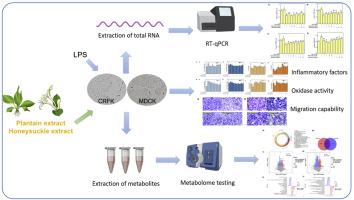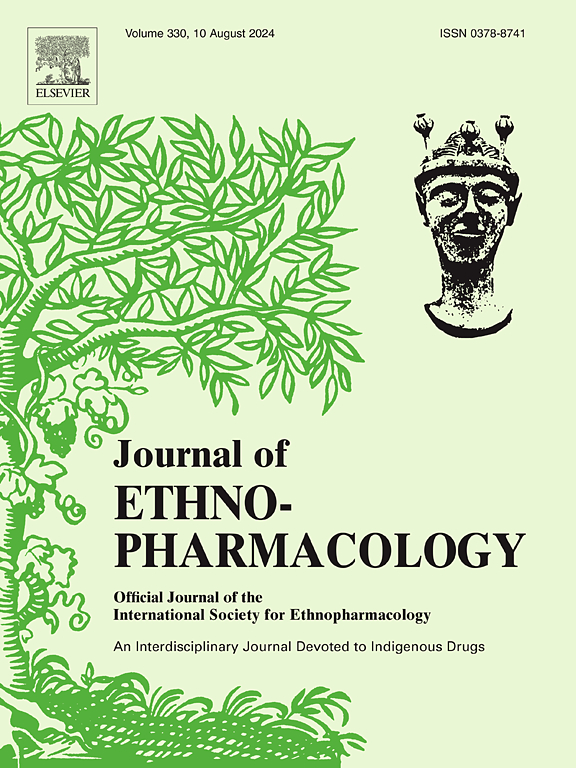Anti-inflammatory effects and mechanism of Plantago asiatica L. and Lonicera japonica Thunb. extracts based on canine and feline kidney cell models
IF 4.8
2区 医学
Q1 CHEMISTRY, MEDICINAL
引用次数: 0
Abstract
Ethnopharmacological relevance
Stone symptoms are one of the most common health problems in pets. Inflammation in the kidneys causes the pet's urine to form a hard substance that blocks the urinary tract. Plantago asiatica L. and Lonicera japonica Thunb., as traditional Chinese diuretics, have remarkable effects on anti-inflammatory and analgesia. However, their mechanism of action remains unclear.
Purpose
The alleviating effect of Plantago asiatica and Lonicera japonica extracts upon lipopolysaccharide (LPS)-induced inflammation in canine and feline kidney cells was investigated in this work.
Materials and methods
Inflammatory factor concentrations and oxidative stress indicators were used to evaluate the inflammatory response. The mechanism by which two extracts reduced inflammation was explored using quantitative real-time polymerase chain reaction (RT-qPCR) and high performance liquid chromatography tandem mass spectrometry (HPLC-MS/MS) metabolome assay.
Results
The results demonstrated that Plantago asiatica or Lonicera japonica extract at safe concentration (25–200 μg/mL for canine kidney cell and 1–20 μg/mL for feline kidney cell, respectively) could significantly reduce the release of nitric oxide (p < 0.05) and oxidative damage (p < 0.05) after LPS stimulation, inhibit the production of inflammatory factors (p < 0.05), and improve cell migration ability (p < 0.05). The RT-qPCR results confirmed that Plantago asiatica and Lonicera japonica extracts significantly reduced the mRNA expressions of TLR4, MyD88, NF-kB, Caspase9 and Bax (p < 0.05), and enhanced the mRNA expression of Bcl-2 (p < 0.05). Non-targeted metabolomics results indicated that the cells treated with two extracts raised the contents of allopurinol, further inhibited uric acid and gout and lowered the contents of adenosine and adenine. Moreover, it was revealed that the Plantago asiatica and Lonicera japonica participated in purine metabolism, glycerophospholipid metabolism, protein digestion and absorption, nucleotide metabolism pathways to alleviate kidney cell inflammation.
Conclusions
The interaction mechanism was revealed to reduce the content of inflammatory factors by inhibiting TLR4-MyD88-NF-kB signaling pathway, and participate in purine metabolism to reduce the inflammation of kidney cells. These findings could provide significant insight into alleviating nephritis in canine and feline, and strategies for preventing urinary tract and kidney stones using Plantago asiatica and Lonicera japonica extracts.

基于犬和猫肾细胞模型的车前子和忍冬提取物的抗炎作用及其机制
民族药理学意义:结石症状是宠物最常见的健康问题之一。肾脏发炎会导致宠物的尿液形成硬物,堵塞尿路。车前草和忍冬作为传统的中药利尿剂,具有显著的消炎和镇痛作用。目的:本文研究了车前草和忍冬藤提取物对脂多糖(LPS)诱导的犬和猫肾细胞炎症的缓解作用:材料和方法:炎症因子浓度和氧化应激指标用于评估炎症反应。采用实时定量聚合酶链式反应(RT-qPCR)和高效液相色谱-串联质谱(HPLC-MS/MS)代谢组分析法探讨了两种提取物减轻炎症反应的机制:结果表明,在安全浓度下(犬肾细胞为25-200 μg/mL,猫肾细胞为1-20 μg/mL),车前草或忍冬藤提取物能显著降低一氧化氮的释放(p 结论):该相互作用机制通过抑制 TLR4-MyD88-NF-kB 信号通路来减少炎症因子的含量,并参与嘌呤代谢以减轻肾细胞的炎症反应。这些发现为缓解犬科和猫科动物的肾炎以及使用车前子和忍冬提取物预防尿路和肾结石提供了重要启示。
本文章由计算机程序翻译,如有差异,请以英文原文为准。
求助全文
约1分钟内获得全文
求助全文
来源期刊

Journal of ethnopharmacology
医学-全科医学与补充医学
CiteScore
10.30
自引率
5.60%
发文量
967
审稿时长
77 days
期刊介绍:
The Journal of Ethnopharmacology is dedicated to the exchange of information and understandings about people''s use of plants, fungi, animals, microorganisms and minerals and their biological and pharmacological effects based on the principles established through international conventions. Early people confronted with illness and disease, discovered a wealth of useful therapeutic agents in the plant and animal kingdoms. The empirical knowledge of these medicinal substances and their toxic potential was passed on by oral tradition and sometimes recorded in herbals and other texts on materia medica. Many valuable drugs of today (e.g., atropine, ephedrine, tubocurarine, digoxin, reserpine) came into use through the study of indigenous remedies. Chemists continue to use plant-derived drugs (e.g., morphine, taxol, physostigmine, quinidine, emetine) as prototypes in their attempts to develop more effective and less toxic medicinals.
 求助内容:
求助内容: 应助结果提醒方式:
应助结果提醒方式:


